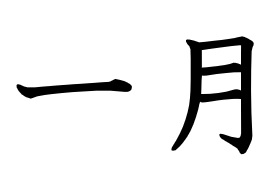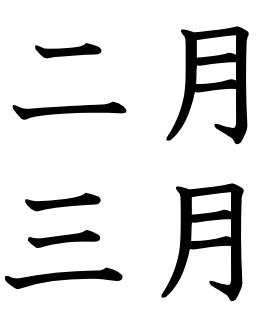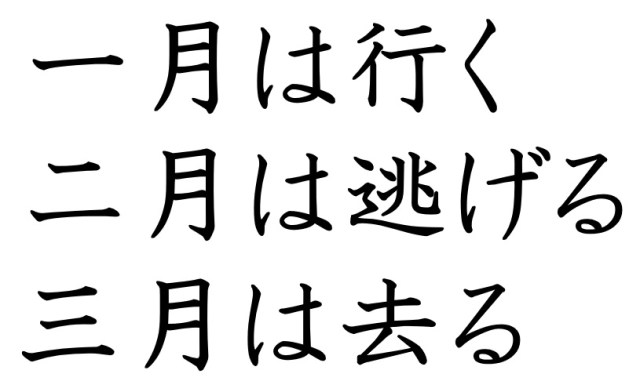
If you’re shocked that January is almost over, Japanese has a phrase for that.
Last month we took a look at the Kanji of the Year and aired out a 30-year-old fart-related translation error in Hokkaido. So let’s keep things going with another look at Japanese linguistics to start off the New Year…
Huh…that’s weird. My calendar says that January is almost over, but I could have sworn it was just the other day that everyone in Japan was trying not to kill themselves mochi, the traditional way to start off the New Year. Sure, I guess things have been pretty hectic after coming back from winter vacation, but we’re already at the end of the month? When did that happen?!?
This psychological phenomenon isn’t unique to Japan, of course. Between responsibilities that pile up while taking time off for Christmas and New Year’s, projects with their starts delayed until after everyone returns to work/school in January, and just the sudden shift back to the daily grind after the most festive time of year, people in many countries feel like January goes by in a flash. What’s unique about Japan, though, is that there’s a set phrase to describe that feeling, and also the fact that it sometimes carries on into the start of spring.
First, let’s go over how to talk about months in Japanese. Just about anyone who’s got even a passing interest in the Japanese language knows that ichi means “one,” Tack –gatsu, meaning “moon,” onto it and you get ichigatsu, literally “one month,” the Japanese word for January.
▼ Ichigatsu
In Japanese, that feeling of January being over before you know it gets expressed with “Ichigatsu wa iku,” meaning “January goes.”
▼ Ichigatsu wa iku
Getting back to numbers, ni and san are the Japanese words for “two” and “three,” and we can add –gatsu to them too to create nigatsu and sangatsu, meaning “February” and “March.”
▼ Nigatsu and sangatsu
Remember how we said ichigatsu wa iku? Well sometime February goes by crazy fast too, especially since it’s the shortest month of the year. So the way to express that feeling is “Nigatsu wa nigeru,” or “February runs away.”
And March/sangatsu? That’s a particularly busy month too in Japan, what with it being the end of the academic and business years at most schools and companies, leading many to remark “Sangatsu wa saru,” or “March departs.”
So put it all together, and the complete phrase becomes:
Ichigatsu wa iku
Nigatsu wa nigeru
Sangatsu wa saru
Or, if you want to be old-school, you can substitute the more classical sounding inuru (往ぬる), which also means “go” or “leave,” for iku and still keep the alliteration.
▼ Ichigatsu wa inuru
The fact that there’s a set phrase for this sentiment shows that it can be easy to get caught up in the busy atmosphere of the first fourth of the year, even if you’re making your best efforts to keep everything under control. So remember to take breaks if and when you can, and don’t forget that once January has gone, February has fled, and March has marched off into the past, in April it’s time to relax under the cherry blossoms.
Top image: Pakutaso (edited by SoraNews24)
Insert images ©SoraNews24
● Want to hear about SoraNews24’s latest articles as soon as they’re published? Follow us on Facebook and Twitter!
Follow Casey on Twitter, where every month is linguistics month for him.








 Seven mistakes foreigners make when speaking Japanese—and how to fix them
Seven mistakes foreigners make when speaking Japanese—and how to fix them Rising Pokémon star Eevee gets her own official dance for the Project Eevee theme song 【Video】
Rising Pokémon star Eevee gets her own official dance for the Project Eevee theme song 【Video】 Secret lunch spot in Tokyo’s Muji Hotel is a hidden gem that few people know about
Secret lunch spot in Tokyo’s Muji Hotel is a hidden gem that few people know about Häagen-Dazs Japan gives us another Crispy Sandwich flavor to swoon over: roasted green tea
Häagen-Dazs Japan gives us another Crispy Sandwich flavor to swoon over: roasted green tea Let’s learn how to sing “Jingle Bells” in Japanese with the help of Santa Pikachu!【Video】
Let’s learn how to sing “Jingle Bells” in Japanese with the help of Santa Pikachu!【Video】 Japan’s new difficult-to-drink-from beer glass protects your liver, but it’s a brutal experience
Japan’s new difficult-to-drink-from beer glass protects your liver, but it’s a brutal experience How to order snacks on a Shinkansen bullet train in Japan
How to order snacks on a Shinkansen bullet train in Japan New samurai glasses are Japan’s latest weird must-have souvenir
New samurai glasses are Japan’s latest weird must-have souvenir New Pokémon ice cream, dessert drinks, and cool merch coming to Baskin-Robbins Japan【Pics】
New Pokémon ice cream, dessert drinks, and cool merch coming to Baskin-Robbins Japan【Pics】 Doraemon found buried at sea as scene from 1993 anime becomes real life【Photos】
Doraemon found buried at sea as scene from 1993 anime becomes real life【Photos】 Burger King Japan suddenly adds Dr. Pepper and Dr. Pepper floats to its menu nationwide
Burger King Japan suddenly adds Dr. Pepper and Dr. Pepper floats to its menu nationwide Starbucks Japan welcomes alpacas for cute summer drinkware line【Photos】
Starbucks Japan welcomes alpacas for cute summer drinkware line【Photos】 High-fashion Totoro cuddle purse is like an elegant stroll in the forest【Photos】
High-fashion Totoro cuddle purse is like an elegant stroll in the forest【Photos】 Studio Ghibli hair accessories keep your style tidy with help from Kiki, Moro, Calcifer, and more
Studio Ghibli hair accessories keep your style tidy with help from Kiki, Moro, Calcifer, and more What if Sailor Moon characters were lingerie models? They’d look stunning like this 【Photos】
What if Sailor Moon characters were lingerie models? They’d look stunning like this 【Photos】 Nintendo history you can feel – Super NES, N64, and GameCube controllers become capsule toys
Nintendo history you can feel – Super NES, N64, and GameCube controllers become capsule toys Hello, cosmetics! Clinique teams up with Hello Kitty this summer for first-time collaboration
Hello, cosmetics! Clinique teams up with Hello Kitty this summer for first-time collaboration Demon Slayer: Kimetsu no Yaiba gets new roller coaster attractions and food at Universal Studios Japan
Demon Slayer: Kimetsu no Yaiba gets new roller coaster attractions and food at Universal Studios Japan “The most Delicious Cup Noodle in history” – Japan’s French Cup Noodle wins our heart【Taste test】
“The most Delicious Cup Noodle in history” – Japan’s French Cup Noodle wins our heart【Taste test】 Starbucks releases a cute Frappuccino and Unicorn Cake…but not in Japan
Starbucks releases a cute Frappuccino and Unicorn Cake…but not in Japan Kyoto Tower mascot termination reveals dark side behind cute Japanese characters
Kyoto Tower mascot termination reveals dark side behind cute Japanese characters McDonald’s Japan’s Soft Twist Tower: A phantom ice cream only sold at select branches
McDonald’s Japan’s Soft Twist Tower: A phantom ice cream only sold at select branches Yabai Ramen: What makes this Japanese ramen so dangerous?
Yabai Ramen: What makes this Japanese ramen so dangerous? Finally! Nintendo Japan expands Switch 8-bit controller sales to everybody, Online member or not
Finally! Nintendo Japan expands Switch 8-bit controller sales to everybody, Online member or not Japanese government wants to build luxury resorts in all national parks for foreign tourists
Japanese government wants to build luxury resorts in all national parks for foreign tourists To combat declining birth rate, Japan to begin offering “Breeding Visas” to foreigners
To combat declining birth rate, Japan to begin offering “Breeding Visas” to foreigners 10 things you should buy at 7-Eleven in Japan
10 things you should buy at 7-Eleven in Japan Studio Ghibli releases anime heroine cosplay dresses that are super comfy to wear
Studio Ghibli releases anime heroine cosplay dresses that are super comfy to wear Woman charged for driving suitcase without a license in Osaka
Woman charged for driving suitcase without a license in Osaka Studio Ghibli unveils My Neighbour Totoro miniature house model
Studio Ghibli unveils My Neighbour Totoro miniature house model Kyoto experiencing problems with foreign tourists not paying for bus fares, but not on purpose
Kyoto experiencing problems with foreign tourists not paying for bus fares, but not on purpose Fighting mild hunger with a Japanese soda that turns into jelly in the stomach【Taste test】
Fighting mild hunger with a Japanese soda that turns into jelly in the stomach【Taste test】 Studio Ghibli’s Howl’s Moving Castle tapestry unveiled in Japan for first time
Studio Ghibli’s Howl’s Moving Castle tapestry unveiled in Japan for first time McDonald’s new Happy Meals offer up cute and practical Sanrio lifestyle goods
McDonald’s new Happy Meals offer up cute and practical Sanrio lifestyle goods Sales of Japan’s most convenient train ticket/shopping payment cards suspended indefinitely
Sales of Japan’s most convenient train ticket/shopping payment cards suspended indefinitely Sold-out Studio Ghibli desktop humidifiers are back so Totoro can help you through the dry season
Sold-out Studio Ghibli desktop humidifiers are back so Totoro can help you through the dry season Japanese government to make first change to romanization spelling rules since the 1950s
Japanese government to make first change to romanization spelling rules since the 1950s Foreigner’s request for help in Tokyo makes us sad for the state of society
Foreigner’s request for help in Tokyo makes us sad for the state of society Ghibli founders Toshio Suzuki and Hayao Miyazaki contribute to Japanese whisky Totoro label design
Ghibli founders Toshio Suzuki and Hayao Miyazaki contribute to Japanese whisky Totoro label design Tokyo’s most famous Starbucks is closed
Tokyo’s most famous Starbucks is closed Princesses, fruits, and blacksmiths: Study reveals the 30 most unusual family names in Japan
Princesses, fruits, and blacksmiths: Study reveals the 30 most unusual family names in Japan Japanese book “nekotan” teaches foreign language the best way possible: by talking about cats
Japanese book “nekotan” teaches foreign language the best way possible: by talking about cats Iketara iku: A simple Japanese phrase that people in Tokyo and Osaka take completely differently
Iketara iku: A simple Japanese phrase that people in Tokyo and Osaka take completely differently Five ways to piss off your older Japanese coworkers at a new job
Five ways to piss off your older Japanese coworkers at a new job Japanese expat remembers the words that changed his life when he started working in Australia
Japanese expat remembers the words that changed his life when he started working in Australia With fires, explosions, and a giant kicking foot, new instant curry commercial is pure insanity
With fires, explosions, and a giant kicking foot, new instant curry commercial is pure insanity Japanese miko shrine maidens turn into off-road racing queens in new commercial 【Video】
Japanese miko shrine maidens turn into off-road racing queens in new commercial 【Video】 Matcha green tea pancake mix coming to Japanese grocery stores next month
Matcha green tea pancake mix coming to Japanese grocery stores next month Cinnabon releases Japanese flavour series in Japan, including Uji matcha
Cinnabon releases Japanese flavour series in Japan, including Uji matcha Cultural differences spoiling the sing-along version of Frozen for some fans
Cultural differences spoiling the sing-along version of Frozen for some fans Spice up boring Japanese classroom vocab with the cooler words in this cute video【Video】
Spice up boring Japanese classroom vocab with the cooler words in this cute video【Video】 A daddy/daughter test of the free baby meals at Japan’s biggest soup restaurant chain【Taste test】
A daddy/daughter test of the free baby meals at Japan’s biggest soup restaurant chain【Taste test】 US Ambassador Caroline Kennedy performs “Koi Dance” in Santa suit【Video】
US Ambassador Caroline Kennedy performs “Koi Dance” in Santa suit【Video】 Hayao Miyazaki draws Year of the Tiger illustration for New Year’s card to Studio Ghibli fans
Hayao Miyazaki draws Year of the Tiger illustration for New Year’s card to Studio Ghibli fans Japanese bag looks like it’s spouting random English, but has an actual message
Japanese bag looks like it’s spouting random English, but has an actual message Japanese manners debate: Is it OK to tell your coworkers “I’ve found a new job?”
Japanese manners debate: Is it OK to tell your coworkers “I’ve found a new job?”
Leave a Reply